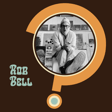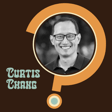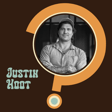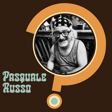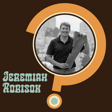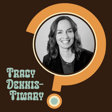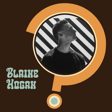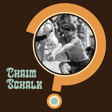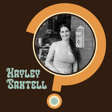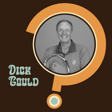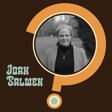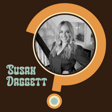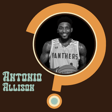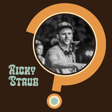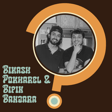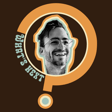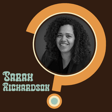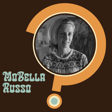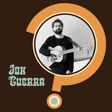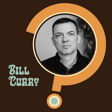Become a Creator today!Start creating today - Share your story with the world!
Start for free
00:00:00
00:00:01

Episode 20 - James Kanoff
James Kanoff is a co-founder of The Farmlink Project, and co-founder and CEO of Terradot. The Farmlink Project connects farms with surplus to food banks to feed people in need. They have rescued 165,000,000 lbs of food, prevented 248,453 metric tons of CO2e Emissions, and delivered 137,500,000 meals. James shares about starting The Farmlink Project with some friends who just wanted to do something to help during the pandemic, how it grew into a nationwide movement, and his vision for the future of food. We talk about leading teams without ego, struggling to succeed in traditional school environments, and wondering what our place in the world was when we were younger.
Follow James on Instagram @jameskanoff
Transcript
Introduction and Guest Background
00:00:11
Speaker
Hello, welcome to What's Next. I'm Joel. This is my show. Today is a fun one. It's my conversation with James Knopf. James is a co-founder of the FarmLink project, which connects farms that have surplus food to food banks, feeding people in need and reducing carbon emissions. The FarmLink project was started by James and a few of his friends in Southern California when they were home from college during the pandemic lockdown.
Growth of FarmLink
00:00:37
Speaker
And it has now grown to a nationwide movement and has delivered over 137 million meals to people in need. James served as the Farmlink Project CEO for its first couple of years. He and I met while working on a few videos to help tell the Farmlink Project story. And I gotta say that spending time with these college kids was really remarkable.
00:01:02
Speaker
They were all volunteers, but they were so well organized and so committed to the mission of Farmlink. It was really inspirational to me. And I was blown away by James's leadership abilities at such a young age. So I really enjoyed having him on the podcast to talk about it.
00:01:19
Speaker
A couple notes before we get into the conversation. We recorded this back in the summer of 2023, about six months ago, so there are a couple references to summer heat, and that might be confusing if you're listening to this when it's released. But also, James' computer died right at the end of the recording, so if you're wondering why it ends a little abruptly, that's why. So with that, let's get to my conversation with James Knopf.
00:01:51
Speaker
Hey, Joel. James. How's it going? Good. How are you? I'm good. It's nice to see you. Yeah, you too, man. Sorry that it has been so difficult to make this happen, but... No worries. You're back in
Personal Lives and Locations
00:02:05
Speaker
the Bay Area? Yes. Yes, I am. How about you? I'm in the St. Louis area now. Cool. How's that?
00:02:11
Speaker
It's hot here. Yeah. Really hot. Oh, man. Well, it's actually happening. How have you been doing? What's going on in your life? Good. Yeah. My wife is in a grad program, grad school program down here in the St. Louis area. So we moved last summer for her to do that. The plan is we're down here for two years.
00:02:37
Speaker
But yeah, that's kind of the update. I'm still working for Tectonic. I'm not traveling as much anymore, but I'm doing a lot of editing and script writing and that kind of stuff.
00:02:46
Speaker
Cool. Good deal. What about you? What's going on? You've moved. I maybe didn't know this, but have you always lived up in the Bay Area since Farmlink started? I came back to try to finish up the last few courses for school, because I dropped out for Farmlink. So I technically finished. Yeah. So are you living in Palo Alto? Yeah. So I've been living on campus. OK. So now I'm moving to San Francisco with a bunch of friends.
00:03:16
Speaker
Oh, you are? Which part? Cow Hollow? I don't know San Francisco at all. They did all of the work. I'm a total freeloader. Sweet. I was just there a couple of weeks ago for work. Whereabouts? I don't know the name of the area, but it's where Salesforce Village is. It feels like there's a square city block that they've retrofitted to being a Salesforce brand. That's crazy.
00:03:43
Speaker
So we were filming down there and then for a few days and then we were filming in North Beach area, which is awesome up there. Yeah, I love it. It's cold though. It was low 60s. It was as hot as it got. This is in the summer? This was, yeah, just two weeks ago. Yeah, summer in San Francisco sucks. Yeah. It's inverse weather. I like it though. You like the cold?
00:04:04
Speaker
Well, I do like the, I mean, I grew up in Canada, so I'm not used to like, I'm not used to like, like down here, where in St. Louis, it gets hot down here and humid. It's like, it can be 95% with 90% humidity. Damn. Yeah, you walk outside. It's like a steamer. Yes, it just hits you so hard. So, I don't like that.
00:04:27
Speaker
I'm used to that California dry heat where it's that hot, but it doesn't feel that hot. Yeah, yeah. Cool. So are you done with school now?
FarmLink's Operations and Impact
00:04:37
Speaker
Yeah, I am. Is everybody remote for Farmlink or do you have offices somewhere? The whole team is remote, but then oftentimes people will be either out meeting with farmers or at conferences, et cetera. Well, thanks for being on the podcast, James. No problem. I've been looking forward to having this conversation with you for a while and getting to know you a bit more. Understatement.
00:05:07
Speaker
Yeah But no, no worries. It's all good so I'm a huge fan of what you guys are doing with farm link just from the Little bit that I got to interact with you guys kind of back what that was that's two years ago now That's crazy. Yeah, this crazy times flying but as I was I
00:05:27
Speaker
putting the script together for what would become the videos that we made for you guys and just getting to know you all through conversation and then hanging out with you guys and filming with you guys. It was just a really inspiring time and I loved the energy that was around the movement and what you guys were all doing and it's just common sense and you're getting these amazing results. So the problem that Farmlink's solving is that
00:05:55
Speaker
There's millions of people in the US that are food insecure and at the same time we're throwing away billions and billions of pounds of perfectly good food every year and that doesn't have to be the case. It's actually these two problems can solve each other. Is that still how you talk about the problem? Yeah, yeah, yeah.
00:06:18
Speaker
Absolutely we try to keep it on its simplest way like i almost think part of the language that we've sort of adopted is like rather than even viewed as waste is like or even surplus is viewed as like abundance and like it's actually we should celebrate it's amazing that our food system can produce this much food like that is a triumph.
00:06:37
Speaker
And then the question is, what are we producing so much? We have all this extra. The question is, what are we doing with that extra? Do we let it go to a landfill where it rots, produces methane, causes climate change, or can we make it accessible for communities in a way with dignity, choice? And that's like, I would say that's like the maybe more nuanced way that we talk about it. But
00:06:59
Speaker
At the same time, if you go on our website, it's billions of pounds of food are going to waste while millions of families are going hungry. And this is a way to bridge it. I think we delivered our 128 millionth meal last week. Wow, that's amazing. It's on. But I think if we keep up this pace this year, we will deliver 100 million. So we'll basically double our lifetime things this year. So we're on track to deliver 100 million meals this year. Wow.
00:07:25
Speaker
Wow, and you've done 120 million total so far. Yeah. Wow, that's that's incredible. Okay, so I want to know about you, James, I want to hear a little bit a little bit a little bit about you and you're still pretty young. And yet, like you're choosing to orient your life around like some really specific things.
00:07:44
Speaker
giving back, making a difference, building something that can do that, that can involve other people. I'm just curious, how do you get to here? What happens in your life that leads you to this point? I can only imagine that you didn't grow up thinking, I want to be working in the food space.
00:08:05
Speaker
Yeah, not at all. Totally. Is this something that you're being really deliberate about or is it just like doors are opening and you have some general compasses that are guiding you and they're kind of aligning to this opportunity?
James's Personal Challenges and Growth
00:08:22
Speaker
Got it. Should I actually start answering these questions?
00:08:27
Speaker
Yeah, just jump in. Yeah, just jump in. So we started. This is the podcast. Yeah, we've already started it. We're on a podcast. All right, I thought it was the pre-podcast. No, no. The pre-banter is the best part anyway. All right, it's started. This is very unproduced.
00:08:45
Speaker
Cool, yeah, so I'm like the youngest of four from Los Angeles. You grew up in Los Angeles? Yeah, I grew up in LA. I was like pretty dyslexic I guess in school. Didn't know I was that, you know, it's only kind of in retrospect, but like school is like typically pretty hard.
00:09:05
Speaker
how old were you when you learned that you I think it was in like 10th grade that I was told I read it like a third grade level or something so it was like okay well things sort of start to click into place for you about like why things were hard yeah yeah exactly it was kind of a weird
00:09:21
Speaker
thing of like being like particularly good at some things and then like really really bad at other things like reading. And like basically I ended up having like a teacher like force me to go like do these test things and then like that kind of changed my life I would say. Because it was like oh this is the thing so this is kind of how you work around this and then because of that. Yeah. I was able to do a lot better in school and X, Y, and Z. You got some tools for how to like overcome some of the challenges that you had.
00:09:50
Speaker
Yeah, yeah. And more than that, honestly, at this time, I started to find film. Oh, really? And I fell in love with it because you didn't need words to really communicate. Wow. I didn't know that. Yeah. And sort of where I'm going with this is in that
00:10:07
Speaker
like love of film or whatever. I graduated high school and I decided to take a year like off before going to college or a year on really work where I was like basically I'm gonna have a camera. I can basically I think like fund myself to live by making films and I'll like go around trying to do that. What kind of films?
00:10:27
Speaker
So I ended up working largely on disaster response teams in the Middle East and Central Africa, responding to like climate induced and like human made famine situation. So in South Sudan and in Syria. And from that, I think that whole year, honestly,
00:10:46
Speaker
just sort of reoriented myself so that when I then when I ultimately came to Miami College, I mean, I was like pretty gung-ho of like, I actually know exactly the kind of things that I want to be doing. Okay, so you, you went to Sudan and to where else? So I was, I guess I was based in Nairobi, and then we worked in, in South Sudan.
00:11:08
Speaker
and a little bit in a rebel region in Sudan too. And then we also, and then also in Syria and then also actually in Nicaragua when there was that like a student led uprising actually with Aiden co-founder of Farmlink. Wait a second. So let me get the, let me get the back straight here. So you were making news media.
00:11:29
Speaker
I was working for the Disaster Response Humanitarian Relief Organization. It's this group called HEART. They're awesome. My job was to record what was happening, and then they used that to either communicate, advocate in parliament, et cetera, of like, hey, this is happening. We need to do something about this.
00:11:51
Speaker
Or they can use it for, yeah, trying to dictate resources. So one of the things we were doing in Sudan was there was a region that was basically being, humanitarian aid was being used as basically a weapon. And so they were denying food access. And that's obviously a war crime. But no journalists had been in there. And we had to go actually document evidence that this was happening. So my job with the camera is just to really try to capture some of that.
00:12:17
Speaker
Wow. Okay. So you were, you were like camera operating. That was your. Yeah. And then you would just upload the footage and send it to the, send it to an editor guy. I, one man show, I wish there was an editor. Yeah. And then, and then I would get back to Nairobi and then spend a week in a cave just editing stitching stuff together and then send that out. Wow. You would get assignments from heart and then you would make a plan. Did you have fixtures on the ground and.
00:12:43
Speaker
Yeah, yeah. So they had it set up. So like someone else from their organization is coming, you know, they were doing other things and on the these like trips or whatever. And they're, you know, there's someone there who's documenting really trying to understand the needs doing like assessments, figuring out what are the gaps? Why are different things happening? And I'm basically tagging along trying to document different pieces.
00:13:05
Speaker
Okay, there's a like, I feel like if you want it to be a filmmaker, there's some other other choices available to you. That's a super intense way to go about it. But really, really cool. Why that? I mean, I think it's the same thing. Yeah, I think it's the same reason you make films probably too. It's like you can maybe you start you fall in love with like the creativity of it and the images. But at the end of the day, it's like you
00:13:31
Speaker
You want to use it to do something that that matters, whether it's a film that moves people in a way that the changes their life or like in this case, this was like a very tangible. Hey, make this film document this thing in a compelling way and like we can actually get aid.
00:13:46
Speaker
into a region that otherwise is being denied it. So yeah, I think it was just like a pretty direct way. And then also like, I'm, I don't know, 18 or 19 years old. Yeah, I was just gonna say, I don't, yeah, you don't, I don't really know, you know, you don't know why you do half the things you do when you're 18 or 19.
00:14:01
Speaker
Right. So you did that for a year? Yeah, correct. OK. Wow. And you were doing that with Aiden? Or you were there on your own, and then there was a couple of times where you met up? Yeah, so I was there on my own. And then it was actually with Aiden. He was in his first year at college and was, I think, having a hard time and called him and was like, I just don't feel any purpose to see what you're doing. Let's go do something together. Because we used to make films, and we were little kids together. OK.
00:14:31
Speaker
There's basically opportunity to document the students who are leading basically a revolution against the oppressive dictatorship in Nicaragua came up in. These kids were like our age and they were leading this thing.
00:14:46
Speaker
from they basically barricaded like the the government had started to track crackdown on protests and then these students essentially barricaded their universities really out of like protection because they were kidnapping a lot of the kids and pretty soon like other universities started following suit and then towns started following suit and then even like cities were setting up entire barricades to try to keep the the government out and um well they're so
00:15:13
Speaker
compelling and kind of seeing what they were doing at 18 and 19, you know kind of made I think a lot of us realize that you can do a lot when you're when they're yet young and you're seeing those people like really really step up and so I think like The reason I bring stuff is that you're saying is like how did you ultimately end up doing these things? Like that year had a huge I think impact on sort of how I see see the world. I
00:15:36
Speaker
Yeah, for sure. Dyslexia made succeeding in the traditional way at school difficult for a while. What did that do to you as a kid when you thought about what was possible for you? Did you feel like that was limiting you or did you sort of feel this sense that I just need to get out of here and then I can spread my wings and nothing will really be holding me back then?
00:15:59
Speaker
Yeah, yeah, I mean, I think the kind of like factory setup of schools like kind of crazy like to take, you know, 50 kids cramming into a classroom, everyone's sitting in their desks, like kids are meant to be outside, they're meant to be moving around, like, yeah. And the idea that like, you know, you don't exactly fit that mold. And so then you're, like, initially struggling is like, that to me, it always felt like kind of the way my brain works a different
00:16:22
Speaker
But I always viewed it as a strength, if anything. I knew it was different, and it results in me doing different things and seeing things differently. And I'd always viewed that as a positive. But honestly, some of the ways I think about it, there are conventional limits to it. And I feel super fortunate. I had this math teacher that really watched out for me. Notice this was like, I think you're really actually gifted. It's not showing up on these tests, because I think this is what you've got to do. If we can go do this, we can get you the sport you need.
00:16:51
Speaker
99 out of 100 kids I think don't have that teacher who who kind of deal with this and they really never get that chance. Right. And so that's something I think about too is like, yeah, honestly, like I'm super lucky and super, super fortunate that I had someone watch out for me and really like actually do that. And it's such a sucks that most kids who maybe think similar to this really don't get that chance.
00:17:15
Speaker
Yeah, right. What I'm hearing you say is that you had this internal sense that there was actually nothing wrong with you. It was the environment you were in that something wasn't right. Yeah, I knew I was different than some of the other kids, but I never thought that was a bad thing. It was just different. I think a lot of people are different and they think in different ways.
00:17:41
Speaker
That's like something that should be celebrated and it just doesn't exactly fit with kind of how we do school today. Yeah. So did you feel like you are getting that affirmation and that confirmation that you were okay from your parents or where were you getting that from?
00:17:55
Speaker
I'd say I feel like I've, I was the youngest before, I had like the most supportive family, like of all time, like mom, dad, like at your sports games kind of, kind of people, even though they're really busy working, they'd still find, find a way to be there. And like, same thing with, with my siblings, like always, always watching out for me. So again, I feel like on a lot of different things, like I had really won the lottery.
00:18:18
Speaker
Yeah, what do your parents do? Did they do things that were outside of the traditional? No, not at all. And my three siblings are all on very traditional paths. But like, yes, my mom, you know, I was way different than the other kids from like age three. So.
00:18:36
Speaker
Yeah, they just knew. Yeah, it's just different. For better or worse. Yeah. Well, I think that there's something about, because even being a parent, there's a sense that can come about when my kids are acting different than the norm of the other kids in some ways. It's very easy to see that as a problem that needs to be fixed, but to just affirm them that
00:19:02
Speaker
that nothing's wrong. And even to do that actually not through words or whatever, but it's much more through the intangible ways of affirming somebody where they just know that they're loved and there's nothing wrong with them. I think that there's a way that you can set somebody up to be incredibly resilient when they've received that as a kid. That's so well said. And yeah, I just hope that like, you know, I think that's unfortunate, probably like not the experience for
00:19:31
Speaker
for a lot of kids and but that's like what an opportunity as a parent and, you know, yeah, if I ever do have kids and 20, 24 or whatever, but if I whenever that day comes, I try to try to do that. So and I'm sure what your your nine year old and five year old probably thinking the same thing.
00:19:46
Speaker
Well, I mean, I hope that they can have that experience. My own journey to get to who I am now, sort of, that is one of my main things that I'm having to fight and overcome is that, or just that the default isn't that I'm a problem. Sometimes I am the problem and I have to adjust, but the default is not just that I'm the problem, you know? Totally. There's so much more curiosity and so much more interest in what's going on around you when you don't feel like you have to change yourself. Yeah.
00:20:14
Speaker
Okay, so you so but did your parents have and your family have this sense of responsibility for the
Influence of Family and Education
00:20:20
Speaker
world around? Like, did you do you feel like you got that from from them? Oh, yeah, yeah. I mean, I think, like, that's the
00:20:28
Speaker
That one is like so ingrained that you don't even really appreciate it I guess because it was just like from I guess like the get-go it's like everything was always community oriented and what are you doing for for other for other people whether it's friends or people you don't know and like definitely from my parents like the like elementary school I went to is very very oriented
00:20:52
Speaker
In that way and that's when it's like hard to even reflect on because it's just like all That I know and it's only in retrospect where you're like, oh that's not necessarily the default for everyone
00:21:02
Speaker
Well, especially Southern California LA has the opposite kind of stereotype attached to it. It gets a hard rep. Yeah, for sure it does. There's definitely good people there and stuff, but I could imagine growing up there could have challenges where there's so much image conscious pressure that could easily suck your attention away from the needs of the people around you.
00:21:30
Speaker
Totally. With social media stuff, I think that's a difference. My siblings all went through the pre-social media days.
00:21:41
Speaker
whereas like our kind of year and like I kind of watched with definitely a lot of people kind of in our class who really did kind of struggle with that as kind of the first generation that was going through it where there kind of was no rules or safeguards or not really. There still isn't really. Yeah, true. Scary. Yeah.
00:22:01
Speaker
So do you think that you really just from the guardrails and the example of your parents and your older siblings that kind of kept you uninterested in that? So I think I always felt to your point really supported and I never really felt like something was wrong. Necessary with me like I felt like oh, this is actually I think differently and that's that's a superpower. And and because I felt supported by my family, I think I felt comfortable then being like, hey,
00:22:30
Speaker
I'm gonna take my camera, I'm going to move to Kenya, and I'm gonna figure it out. And I know that that's what I need to do. Yeah, and how did they respond to that? Like, really supportive.
00:22:47
Speaker
You know, maybe there's like, are you sure? And I'm like, yeah, no, I'm, I'm sure I've thought a lot about this. Like you, you really need to go into war zones. I mean that we didn't, we didn't, we didn't lead with that. No, I just, I even like, I started, like I was, I was shooting videos for like a safari company.
00:23:07
Speaker
Oh, so you went to Kenya without even a work lined up? I had a thing to shoot for a safari company for like a week and then kind of emailing a bunch of NGOs. Like I emailed probably 50 NGOs. Yeah. Like a single one replied to my like pitch. Wow. Essentially saying like, you know, if you could cover travel and food, like I'll work for free basically was the pitch.
00:23:33
Speaker
And then none of them even replied that's not nothing except one heart and was like, yeah, like when can you start? That was hard that was yeah, and so that's the one I ended up ended up working with him So you went and you went to Kenya alone? Mm-hmm. Like you didn't know anybody else? No, you had you had an apartment lined up or how did you what did you what was your plan? I
00:23:55
Speaker
I stayed with the Safari company guide basically. Like for the week that you had the job or what? I stayed there and then he was kind of always out and I was like just kind of editing the video and I don't think he minded the company. You lived in that place for the year? Not for the whole year. So I was, I mean I moved all, so I was there and then
00:24:20
Speaker
is in Uganda for a bit and then South Sudan and Sudan kind of back to Nairobi. There was also like there was the election in Kenya had just been overturned and like Kenyan elections are always.
00:24:33
Speaker
You know, they always, I remember the joke is like, it's so crazy that you guys after the election, you know, everyone just goes home peacefully and it's like the other side won because the last three years, like they have like end up with like a lot of, a lot of violence. And when it got it overturned, there was all these protests. And so then that was kind of how I was kind of thrown into, to that world because a lot of the safaris and stuff had been canceled all of a sudden, like, you know, my only,
00:24:58
Speaker
Have work and I'm here like at this thing or this somewhat historical thing is happening with the camera. Yeah Yeah, it's more more happenstance than than anything else But no, I was like I was moving around like worked on shark boats like in South Africa basically like cleaning up people's throw up Getting to film getting to film an hour a week, but mostly just scooping scoop and drop Wow So yeah, I got to do quite quite a bit of stuff. I
00:25:25
Speaker
Wow, and so you were doing that for a year, you said. Did you say I'm only gonna do this for a year when you went into it or were you kind of figuring out what you wanted to do throughout that year? Yeah, I was set to do it for a year and I mean you could have done it forever too. But I also kind of looked at like that
00:25:46
Speaker
I think that's a super hard operating in those zones and then going back home. I think that's a really hard thing to cognitively do. And I have so much respect for journalists, humanitarian workers who are doing that because I think it's a huge personal sacrifice to actually have that be your life.
00:26:05
Speaker
style and how you do that. It's one thing to be an 18 year old kid with like very little responsibility. Whereas like most people, you know, they're away from their kids and their family. And I think that like, that's a huge, huge thing. And it's probably not the path that I wanted to go down.
00:26:20
Speaker
Yeah, was the main idea you wanted to have that year to gain some life experience and to do something that was impactful and to sort of set you up for the next thing that you were going to do? Yeah, I mean, I just I felt like I was on somewhat of this just like treadmill and like, you know, hardly understood.
00:26:37
Speaker
what the world was like let alone who i was and and i wanted to figure that out and i knew that i could fund that with film which is something i like love doing like wake up every day really happy and then impact or like want to want to do that to try to to to help people and so kind of all those things were just kind of married together
00:26:55
Speaker
Yeah, so I'm trying to get a handle on your experience compared to mine. When I was that age, I definitely was in high school.
00:27:11
Speaker
I was really kind of angry at just angry at stuff at the world and I was bitter about stuff and felt very introspective similarly in the way that you're saying like, who am I? And I don't know what the world even really is or how to figure it out. But I feel like a lot of that came from the music I listened to.
00:27:36
Speaker
A lot of it came from some of the people that I hung out with, like my older brother and sister and their group of friends. They were much more
00:27:46
Speaker
you know, they had those kinds of conversations. I don't think I really had too many friends myself that we were talking about stuff like that with. Yeah. What was your, where was kind of your main source of, of where those questions came from? You know, yeah, I'm not sure it was something we like to your point, like really sat around and, uh, you know, chatted about on the football team. Yeah. It wasn't, it wasn't that, um, I don't,
00:28:18
Speaker
Do you know who Sebastian Younger is? Sebastian Younger? Yeah, he's like a journalist, he has this book called Tribe. He stayed with a US outpost in Afghanistan for a couple of months and he basically lived with those guys and then he would kind of track them as they came home. He just ended up with these really interesting insights about what it really means to be human and kind of noticing these things of
00:28:40
Speaker
I don't know where it came from, but I always had that sense.
00:28:45
Speaker
the way we live today is very very different than the world that we actually evolved in and actually in some ways like the outposts where those.
00:28:54
Speaker
people like were, were fighting was actually much more similar to the environment where they evolved. You're sleeping in really close quarters with just a small group of people six inches apart. And he, you know, he describes of like how he'd never slept a better night there than when he came home and he's sleeping by himself and he's having night tires and all these things. And my point being is like, it always seemed like something wasn't, something wasn't exactly like right.
00:29:21
Speaker
in his modern life yeah yeah exactly like in the sort of the the like ending up thesis is ptsd like from an evolutionary perspective like makes sense like you have a really life traumatizing event it makes sense you're gonna have nightmares about it you're gonna worry about it
00:29:37
Speaker
long term chronic PTSD from an evolutionary perspective does not make sense. Like from an evolutionary perspective, if you had that and it really hindered your ability to survive, like you would not have made it. And so his basic thesis is then something about the environment that people are returning to versus the environment they returned to an evolutionary perspective is actually causing this. And like, maybe it's not what happened abroad that's causing the PTSD. Maybe it's what they're not seeing at home.
00:30:02
Speaker
And I think that's something that started to, from my year, started to click with me too. Honestly, just a lot of the isolation that comes with sort of just the way things are set up and a little bit of just feeling of loneliness. We're the only, like early generation where kids sleep by themselves in their own, that never happened. So. Yeah, yeah, yeah, yeah.
00:30:30
Speaker
That's interesting. Did you read that book when you were younger? I think I read it during that year off. And I was like, wow, yes, this clicks with me. But it was like maybe something I'd felt but could never really, honestly, the whole dyslexia thing definitely couldn't put words to it. Did you have a pretty significant wanderlust too? Like you just felt like you wanted to see new things and experience new things? Yeah, yeah.
00:30:59
Speaker
wanting just like I think like a lot of people like feeling like there maybe there's something else or there's something more um and kind of like trying to answer the question like why why are we actually all here yeah I don't know I think that's something that like a lot of us
00:31:14
Speaker
especially at that age, like are wondering. Did you get an answer? No, no, not even not even close. I still remember there is a point we were in Nepal going like up to base camp and we were staying with like a monk and we stayed for maybe two or three days and
00:31:36
Speaker
I just remember at the end of the trip, we talked for a long time. I had a lot of questions for the mom. I was like, this is a guy. If anyone's going to know why we're here, it's this guy. You spent two or three days with him just firing questions at him? Not for two or three days. I was respectful, and I just tried to.
00:31:55
Speaker
I just remember the last that you gave this like kind of like shawl shawl thing and he gives a hug and it's like, hey, like I really I hope you find what you're looking for. You know, I'd never even said those words or that I was looking for anything and like he just intuitively understood that like that was and the answer is like, no, I don't think I don't think I've I found it if
00:32:16
Speaker
Yeah, I don't know. I don't know what it is. If you know, please, if you share this on this podcast, this thing probably go everywhere. Yeah. I'm saving it for the very last episode of the podcast. So you finish up your year. You decided at that point that you want to go back to college. Is that right?
00:32:36
Speaker
Yeah, correct. So so I'd gotten into Stanford and deferred like admission or whatever. Okay, so like I was able to what did you want to go for? And what was your plan? I had no I had no idea like, okay. No plan. I loved I was you know, I'm 18 or whatever and I just get who loved making films and had a lot of thoughts and questions about the world.
00:33:01
Speaker
But you would, you didn't go to Stanford for any kind of film that I don't even think they have making. Yeah, no, no, no, not not at all. I kind of probably always knew I do doesn't really make sense to get a degree in film. I probably would do like some sort of computer science stuff.
00:33:17
Speaker
That was what you were thinking? Yeah, I mean, it's more or less what I ended up doing. So what is your dream? It's something called symbolic systems, which basically computer science, psychology, and philosophy. And it's kind of like trying to understand the mind, which like, God, man, I really picked the wrong lane here because this major is just a feeder right into the AI world. I really blew this. Not playing my hand right. Yeah, you're getting into food.
00:33:49
Speaker
All this training and literally the thing that could not be more relevant right now of like AI philosophy and psychology and like looking at how the machines become minds blowing this. That's crazy. Now I remember you saying that actually now that from back when we were making the videos because
00:34:13
Speaker
Reed Hoffman did symbolic systems, right? I did not even know that. Cool. Yeah, I think so. Okay, so you're in school and the pandemic hits.
Founding and Philosophy of FarmLink
00:34:23
Speaker
That's when the seed of farm link gets going. Yeah, I mean, exactly. I think you probably remember everyone sent home and we're all sitting in our rooms and
00:34:35
Speaker
it feels like you're watching kind of the world fall apart through your through your phone screen and i think the guidance of the time was like the best you can do is just like stay home yeah and i had always had this idea that like and i'd from my year off like in time to crisis like people come together like that's what they do they find ways to to help each other and
00:34:53
Speaker
Like the nature of the pandemic was like preventing that entire concept. And so at some point it was like you're seeing these mile long lines. I remember it's like the drone shot going over the Pittsburgh freeway for a line for the food bank. And like half the families are turned away that day and it's miles long line. And at the same time, you're seeing these photos of millions of pounds of fresh food, millions of gallons of milk, hundreds of thousands of eggs being smashed, thrown away.
00:35:19
Speaker
So at some point it's like enough is enough. We're going to do something. Who knows if it's going to work. We need to do something. And our local food bank was having the same problem. And so it just kind of made sense to start there and see if we could connect one farm to one food bank. The friends that you did this with were the kids you grew up with.
00:35:36
Speaker
Yeah, exactly. So like, I mean, eight and I did those films, he has like, we always do been doing projects together since we were, you know, in sixth grade. So it's like, yeah, let's, let's try to figure out how we can actually make this happen. And yeah, and it was, I mean, just like group chats or friends like, Hey, let's start calling farms. See if we can find surplus.
00:35:53
Speaker
One of the things I've always been curious about is like, how did it grow? Because you're just like a few of you that are like, OK, let's go do this. You rent a U-Haul truck. You find a farmer who's like, OK, yeah, I'm going to throw all this food out anyways. Come get it. You do it. But then how does it grow to being these group chats of friends and then to being these bigger group chats to be this thing that becomes bigger than you?
00:36:19
Speaker
A little bit the way you kind of just described is like it's like started with like, you know, you know pressuring my siblings to help right or like my close friend Okay, come on. Let's like let's let's do something Yeah, call a couple for here's a spreadsheet when you call these these ten farmers to them like pretty soon like we were intentional Even on like this like first couple deliveries and like close everyone which wanted to help. Hey, this is a great thing Let's keep doing this is a crisis we can do our part other people that maybe were wired similarly and
00:36:45
Speaker
But we always had a sense of, like, the goal wasn't just that we could help our local food bank, but it also the goal wasn't, oh, we could do this so many more times. It was, hey, if people see the story of, like, if students are doing this, they're driving these U-Halls, and it's like, maybe we can do something for our local community, too. And so it just ended up being then, like, in sort of, like, say, like, painting farm link on a bed sheet and strapping it to the U-Haul in that photo, like, it, I think, like, tapped a cord
00:37:12
Speaker
with people because at that time everyone's just feeling so hopeless like we're the world's falling apart we're all screwed no one even cares um and then like photo of like farm like written on this u-haul truck getting it farmed with the food bank i think it tapped into something of like
00:37:29
Speaker
just like the smallest amount of hope and a lot of people gravitated toward it, particularly like students. So once we had put up a website, just people are reaching out saying, I want to help. So the decision even to make a website was that because you had had enough people in your circle say, this is a really cool idea. Like we think more people would be interested in doing this or like, what was, what, why even make a website?
00:37:53
Speaker
I think in this is like story of Farmlink is like the no mastermind behind it rather like decentralized group of a lot of students finding weight. So somebody had the genius idea. Somebody did it. Yeah, it wasn't me. They were like, Hey, we should put up a website so people can like find and so they just
00:38:10
Speaker
you know, one late night, put it up and then you see in the text, hey, I made us a website. And we're like, cool, great, I'm gonna go call farmers. And like, honestly, like Farmlink even growing like throughout that is like, it's actually a bunch of individual students who like made decisions that could improve something a little better, come up with a different idea. And if you do that enough times, like then you end up with like a full, a full operation. It wasn't like we, again, because we didn't know what we were doing. If we had tried to design anything, it would have been a disaster.
00:38:39
Speaker
One of the things I'm really interested in is putting things through the filter of me because that's the only way I'm able to understand things. Same. If that was me in your shoes and there was all these other people doing stuff and it was decentralizing and taking it, I would have these strong feelings of like, oh, this is something that's being taken away from me. Interesting.
00:39:07
Speaker
Like there'd be a lot of bruised ego a lot of potential for a lot of bruised ego going on How did that did you feel any of that or I mean like one and the? This was like if you go back to that time like it felt like this was a crisis It was like grocery store shelves are empty So it's like anything like it was just go go go everything is is helpful Because otherwise like literally people are going without without food and so I think a crisis just like forces you to go I think the other thing in like
00:39:35
Speaker
just once it became a little more organized and we started to kind of figure it out is like you kind of think there's like two different ways to like run things you could run it like a symphony where there's like a conductor and they know exactly and they tell this note and that note and like everything is like
00:39:51
Speaker
perfect and like that would have been I've been so bad at that but instead we ran it more like a jazz band where you kind of want to provide context for everyone about what you're really trying to do but then really let them improvise and kind of play off each other and let the farms team and the food banks team kind of do their thing but see what the other one's doing and then they kind of adjust and and you can create something just as beautiful as it as a symphony yeah we all find jazz to be this beautiful thing but it's improvised it's
00:40:18
Speaker
Dynamic it's constantly moving. Yeah, and really that that was the way that we set up for Mike
00:40:24
Speaker
So how did you figure out what your role was or what your role was going to be? Was it even that important to you? Or was it just basically like whatever you saw needed to get done? That's what you did. Yeah, exactly. Like whatever we needed to call farms. So I'm calling farms. Now there's people who are better calling farms. So we drive view halls. Now there's people, you know, we have professional truck drivers. So we need to like recruit more people. It's when you'd be calling more farms to, okay, like now there's a lot of people, but no one knows like,
00:40:51
Speaker
What to do is like when you provide context about what the goal is. And I think it's just constantly a changing role where honestly you're fine. You're finding people who are better at the specific role and then letting them completely run with it. And if you just do that enough successive times, like eventually you have a pretty high functioning team. I was kind of a low bar. I was not good at like any of these tasks.
00:41:13
Speaker
You had the heart. So how are you finding the problems that need to be fixed? Talking with a lot of people. One of our biggest advantages, I'd say, is that we literally knew nothing, quite literally. And so we would not make any assumptions about anything. The worst thing you do is you think you're so smart, so you assume you understand the problem, and you completely don't. So instead, we would just
00:41:43
Speaker
Like, hey, I know nothing, and then ask. And so you would ask a lot of farmers, like, what is the problem you're facing? What are things that can actually help you? And you can make it really simple. Food bank, what are the problems you're facing? What are the things we can help with? And talking with a lot of people, and never making assumptions.
00:42:00
Speaker
Yeah, you sell yourself as problem solvers for them. Yeah, exactly. They're just trying to solve their problems. Not even, it's like just, hey, we're just want to under, like, and we're not even solving a problem. Like we're hearing what your problem is. We're asking you what you think can fix the problem. And then we're just carrying it out. And it's when you know nothing, it's kind of the only way you can actually operate because like any assumption you make is probably wrong. Um, but like over time that really, really helps. And it's even like sort of a core value. I think we,
00:42:29
Speaker
I'm sort of put into the company and we like everyone who joined the team is like. We realize like we actually really need to in green some of these things because we think they're pretty vital to. Our ability to do this okay we're students you know nothing that's actually a superpower because you just ask people questions don't make any assumptions about what they need don't design some crazy plan. If you think you have a plan go talk to people to see if it's actually gonna work go try it test it things like that.
00:42:55
Speaker
through all of it, how do you keep your sense of yourself and who you are in check? Interesting. Because again, as things grow and things become, how do you not make it about you, I guess is the question. The success of Farmlink, the success of all these things, how do you separate yourself from all that? It never was about me or us.
00:43:21
Speaker
It genuinely was this story of students coming together to do something and then like not top down, great ideas, like bottom up, listening to people, then actually going and implementing those things. So it's like, it would, I don't know, it'd feel like lying to take credit for like.
00:43:40
Speaker
any of those stuff because like really it was like it was an except exceptional team that that I think that's the other like like star is like the group that came together like these people really really cared like they're so passionate they were so bought and you have people who were you know they're
00:43:57
Speaker
volunteering, whatever you want to call it. We're not even an organization. They're just doing this project 60 hours a week for free. They're staying up till 2 a.m. on the phone with like, you know, freight companies trying to figure this out. And so when you have the opportunity to get to lead a team like that, I think it comes with like a lot of responsibility of wanting to make sure that like you're like, they just know more. It's like you're almost like, I need to get out of the way. Let them do their thing.
00:44:25
Speaker
I less and less feel proud about saying this, but I didn't go to college. My wife thinks now that I maybe have some ADHD and some things like that that made school challenging for me. But I've never been diagnosed or anything like that. But the best day, like top five day of my life still is I remember it so vividly was walking out of my high school for the last day.
00:44:54
Speaker
and just giving it in my mind both middle fingers and just being like, I'm never walking back into a school ever again, you know? And just the feeling like I don't need, like I'm going to need to figure out how to succeed in the world without education because I just can't imagine doing that again by choice, you know? Well, it seems to me like
00:45:22
Speaker
You're clearly wired as like a lifelong learner, right? So it's like, yeah, whether or not you attended the like factory things, like if you're oriented around learning, like you're doing these projects, you're asking thoughtful questions, talking with all these people, like that's in and of itself, not not normal, right? Like those people, they do the school and then they kind of just go into their life and just kind of exist, right? So yeah, there's clearly something.
00:45:45
Speaker
Yeah, there definitely is like a, like even with my work as a filmmaker, I didn't go to school for it or anything like that. Kind of like you, it's just like self-taught, like what are just throwing yourself into situations where you have to show up and make it work somehow. And there's lots of failing, but you look back after a whole bunch of failures and you're like, oh wow, I've actually really learned something here. And I have a knowledge that I couldn't have learned
00:46:11
Speaker
in a classroom. Exactly. But, but wait, where was I going with it? Oh, but yeah, I didn't go to school, right? So I never went to college. And but when I was sitting in that group of kids, I call them call you guys kids, but you're not kids, you're adults.
00:46:29
Speaker
I feel like kids. I was like, man, if this is what being in this kind of environment is what I could have had in college, where there's so much positive energy and so much intention. Everyone was giving each other so much grace. Nobody was trying to take anything away from anybody. There was no messy egos in the room.
00:46:56
Speaker
disrupting everything. It was quite a unique experience. There was one of the only times in my life where I was like, if my experience in college could have been like this, then I made the wrong choice by not going to college.
00:47:13
Speaker
Cause it was, cause it was so, you know, just, there's not very many times in my life where I've been in an environment like that, where that was what the vibe was, where it was just people like sacrificially giving to, to, to create something that was not about their own egos and about, you know, trying to make a name for themselves or any of that. Um, it was really a really cool thing to experience.
00:47:38
Speaker
I appreciate the sense of community among the students on the Farmlink team because of that. It's something I've never been a part of before. And in a weird way, this is the Sebastian Younger thing.
00:47:59
Speaker
That's the kind of environment and community that we actually evolve to live in. Like we want to be in a thing where it actually wasn't about the unit, it's all about putting the group first. We're all isolated, right? You'd think we're actually, it's the loneliest we've ever, our communities will hold away. You're on your Zoom, you're in your bedroom, whatever.
00:48:17
Speaker
But then for two hours a day you log on and you're with this community where it is all about the group and how what can we do to help other people and it's not about any individual it's like.
00:48:31
Speaker
We all, I think, crave that. We crave that sense of belonging to a community like that. And our modern lives, we get very few chances to actually do that. And that was, I'm not even sure I necessarily get that at university, but at forum like that, it's still the thing to this day that I think makes the place so special.
00:48:50
Speaker
Did you just stumble into that? At what point did you realize that that was sort of a product almost of what Farmlink was doing, was creating a space for people to come to to have that kind of experience?
00:49:04
Speaker
I think it was we did we started to do these things like sort of at the end of kind of like every three months would do kind of like an end thing where some new people would join some people would would go and kind of we basically just do like an open mic like anyone can say whatever whatever they want. The thing was scheduled for like 30 minutes and it went for like two and a half hours and
00:49:27
Speaker
So many students would share sort of like what this had meant to them and being a part of a community like this like just something they've never had in their life and or how it would help them through like really difficult times like I think it's those kind of things that.
00:49:46
Speaker
like really, like maybe it was like, oh, it's not just the food we're moving. It's actually when we started saying it's like the community we're building is actually more important than the food we're moving. And when everyone sort of had that mindset at the thing, yeah, I mean, we then we'd start saying it the first time we onboard somebody, like that's like the first thing that here. And then it's just everyone sort of has that as the default norm.
00:50:08
Speaker
Yeah. Was there any kind of worry that as you did formalize into an organization that some of that was going to go away? Totally. Yeah. There was so much fear. Oh my God. It was like, you know, for the longest time, right? We just kept calling it a project for like six months at some point where we're operating with like.
00:50:25
Speaker
Like at this point, all these 10, $20 donations from all across the country, but like it added up to like millions of dollars. And we're students who know that like, and we just keep going. It's just like this project we're working on. And I'm like, yeah, we're just going to go back to school, you know, in the fall and like move 10 million pounds of food. And we're on our way to, and it's like, you know, at some point we actually realized of like, Oh, this is,
00:50:46
Speaker
You know this isn't just a project this isn't like your other side projects you know that like ended in disaster this is actually a thing. I think really like the decision we realize this was just scratching the surface of what's actually possible every year around the world we throw away one third of.
00:51:03
Speaker
all of the food that's grown, like one third of it. Yeah, that's crazy. And so this has nothing to do with the pandemic. This is like in a normal year, it's 30 to 40% of fresh fruits and vegetables go to waste. And I think we realized it's like, we actually could build something here that could really, really change something. And so at that point we decided, hey, we need to figure out how to make an organization. And it was like,
00:51:29
Speaker
It was so hard. It was like the last thing we want to do is mess up this community because it's the most special thing that any of us have ever been a part of and how do we and it wasn't like to this point was not smooth sailing like not easy at all like super super hard and a lot of resistance and eventually right now we have like paid staff who like work to grow the organization and that's how we're gonna
00:51:52
Speaker
get to like a billion meals within the next three years, but trying to do that well preserving, like the very thing that made it special in the first place,
Future Vision and Values of FarmLink
00:51:59
Speaker
huge challenge.
00:51:59
Speaker
Yeah, yeah. Do you see that as kind of your main role to preserve that culture? That became the main role. And I think that ends up being a lot of founders' roles as something grows. That does become their role. It's like, hey, this place that you joined when we were in the garage and you fell in love with it, that's still this place. That's the kind of energy and enthusiasm and entrepreneurial attitude.
00:52:25
Speaker
those are the same things, those values, those are not changing. Like our structure is changing, strategy changes, it's meant to, but like our values, who we are, DNA, our mission, those things are not changing. And like, we're not, believe me, like we're not going to let them change. And I think that a lot of the people who were like some of the original, like people like Aiden, Ben, Stella, et cetera, is like, they just drive that home constantly.
00:52:47
Speaker
Yeah, you know, you said you're 24. How do you get better at that? How do you get good at that? Protecting that? How do you see the filter that I see everything through for myself that I have to guard against or be aware of is supersizing approval.
00:53:07
Speaker
that that doesn't become too much of a motivator and too much of what I'm trying to achieve. What would happen for me is I'd have to find a way to have a compass that's orienting me in the right way, otherwise I could get way too easily swayed this way or that way. And that's me now as a 37-year-old, almost 38-year-old. So how is a 24-year-old
00:53:32
Speaker
Do you get your perspective and get your sense of direction before you make decisions and as you move forward? Yeah, you know like one is a really good like thoughtful question I you right you have kind of like a core set of Like your what is your purpose like farmlings purpose was really clear like corset of corset of values that would guide us in pursuing a
00:53:57
Speaker
that purpose and from my time of fight, it's like short aside, but one time when you're filming and
00:54:05
Speaker
in Kenya during one of the protests where you had kind of the police who were basically shooting at the protest and then it was in one of the townships and like you have the protesters here, you have the police here and literally right in between like this class was going on and right in between that a group of school children walked out and all standing along this wall like right in between it. I'm on the other side of the like over here and I'm looking at this and I remember this like feeling like oh my god.
00:54:33
Speaker
Do I need to drop my camera and I go help? Or am I supposed to take a photo? Because you're not supposed to be involved at all. You're supposed to be a neutral observer. Do I take a photo? Do I go help? And that moment felt like an infinite time, but the answer was I didn't do either. I didn't take the photo and I didn't help because I had never defined those values for myself.
00:54:57
Speaker
There's in the saying is like in times of crisis, you don't rise to the occasion. You stoop to your lowest level of training. And like, I needed to define those values long before I was ever in that township. And that like came from my inexperience. But so like having that lesson, then we started Farmlink is like, no, we're putting values in this thing from day one. Because in a time of crisis, like that's when you need those things. It's not the time to create them. You won't have time. Um, and so for Farmlink, that was what.
00:55:23
Speaker
That was what we did and that's why there is like this strong sense of direction, strong sense of values of how you navigate those things is because we put it in there from the very beginning. Knowing that at some point you might not think you need it right now, but at some point you're going to. And sort of in those hard times we're building, things are changing, like students are going to be like, we need to, that's when we tap on those things. That's when we need those things more than ever.
00:55:45
Speaker
So what now? I know you said you're on track for 100 million meals this year, but what's the vision for Farmlink?
00:55:54
Speaker
I mean, like farming's mission now is to make the world's abundance of nutritious food accessible for everyone. And we really believe there's going to be a day in our lifetime when every person actually has access to the food that they need to succeed. And it's one of the first times in human history that something like that is possible. The truth is like we are producing enough food in it. It's like one of the biggest achievements of mankind. It's amazing that we're able to do this.
00:56:19
Speaker
We now just need to make it accessible for everyone and that's what Farmlink is set out to do.
00:56:37
Speaker
You can find out more about the Farmlink Project by visiting their website, farmlinkproject.org. I really hope you check it out. There are ways to get involved with the work they're doing, but also just to learn more about the issue of food waste. The numbers are staggering. How much food gets thrown away just because of logistical issues and supply chain issues and transportation and
00:57:01
Speaker
and the ways that they're creatively going about solving these problems and feeding people at the same time is really cool, so please do check it out. Also, since recording our conversation, James has gone on to become the CEO of a new company, another company called Teradot.
00:57:18
Speaker
a company that is working to regenerate the planet through carbon dioxide removal and I'm just getting that from the website. I'm excited to see what comes with that company because I know carbon capture and carbon removal is something that he was really passionate about at Farmlink. He's just a really remarkable person and I enjoyed the conversation with him a lot. So the links to those websites are in the episode description.
00:57:44
Speaker
Alright, that is it for this week. Thanks so much for following along and listening. Please subscribe if you're liking the show and tell your friends and family about it. That really helps me out a lot. And thanks for listening. Thanks for being here. We'll see you again next time.
